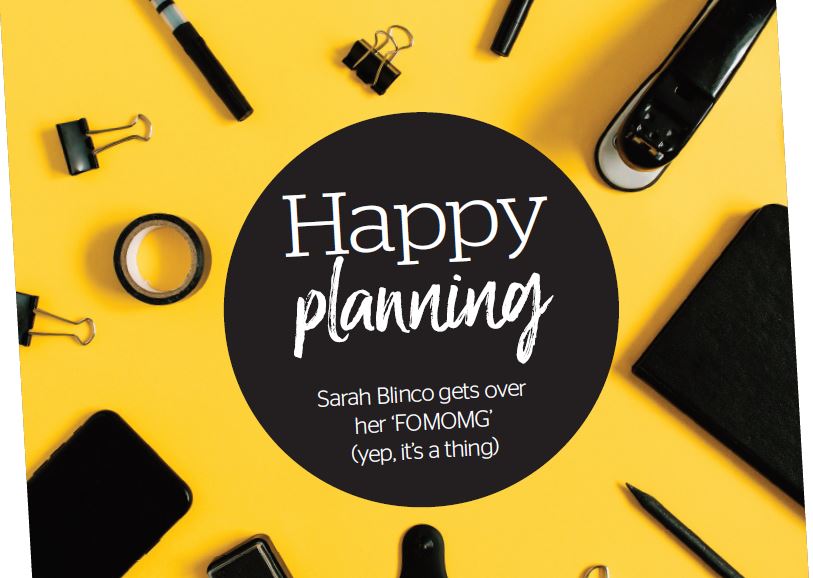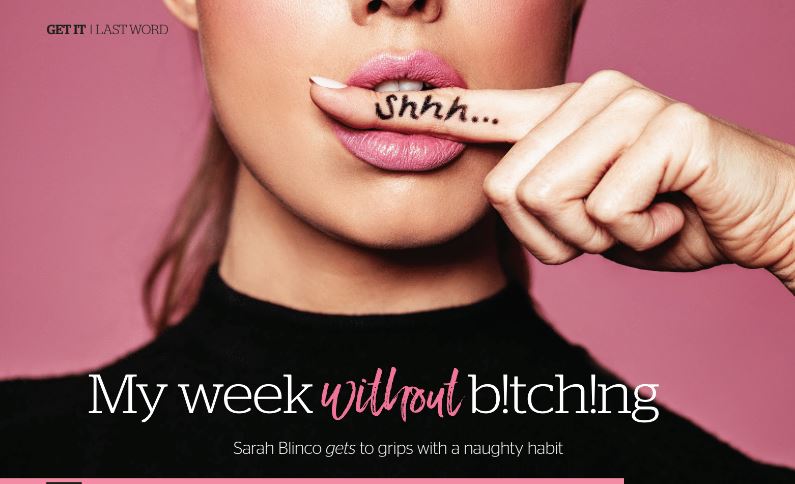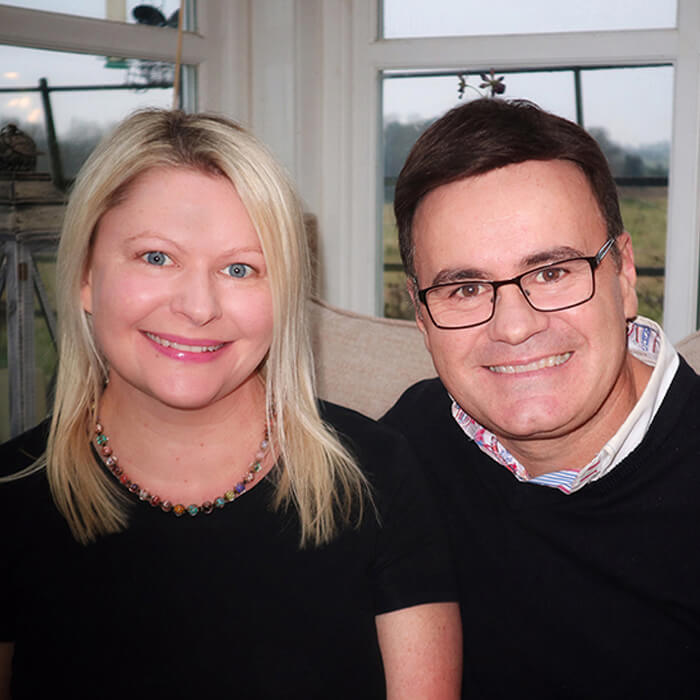
by Sarah Blinco | Jan 1, 2019 | Lifestyle, Travel blogger destinations, Travel Live Learn in the media
I love January! I think I like it more than Christmastime, although both come with their own set of rituals, demands and expectations. It’s important to remember that we can make a fresh start any time, which I’ll cover here, but as it’s the New Year…
Every day is a fresh start, but 1 January is extra special
For some reason, New Year has always served as my reset point; my joy-and-motivation initiator – my reminder that every day is a fresh start. Certainly, that may be cliché, but I’m sure others see it the same way.
I also know I’m not alone in scrapping the whole ‘resolutions’ and ‘goal setting’ business. January 1 is a holiday, my uncle Doug and cousin Liz’s birthdays. The only pressure I want to experience is the cork popping out of a bottle of bubbly!
How to do January (or any time, for that matter) stress-free but with maximum impact then?
I’ve been practising for a few years and have simplified my start-fresh ritual.
Here’s what I’ve learnt:
Read
A book, that is. I’ve spotted a pattern throughout my year – when I’m perpetually emailing or mindlessly scrolling Facebook each evening, I’m less happy than the times I’m engaged in a good read. I’m more of a non-fiction gal myself, but it doesn’t matter what your preference is. Find time to read. It’s too easy to fall out of the habit of reading books, but the practice has proven health benefits including improved memory and reduced stress.
Tip: Not sure where to start? Ask for recommendations on Facebook or talk to friends. Take it one step further and join a book club this year (there are countless options, both on and offline).
Listen
We are blessed with thousands of free interesting, inspiring and motivating resources at our fingertips. If you’re short on time, try the Blinkist app that summarises popular books into 15-minute sessions; or start a routine of listening to a Podcast once a week. Breathe and Calm are fabulous apps that will get even the most resistant amongst you into healthy meditation and mindfulness habits. The most accessible of course, is YouTube, with more hours of content than we can consume in four lifetimes. Much of it is even very good!
Tip: Sign-in to YouTube with your own unique account, so you can personalise your experience.
Talk
Make this the year you engage a coach or mentor. Since I opened up to this, my life has changed. I used to think I had to do it all on my own, but now I know for sure that surrounding myself with guides is wise.
To clarify, I see a ‘mentor’ as someone to look up to; whose footsteps I’d like to follow in, and who shares helpful advice. A coach, is usually someone who talks you through questions that help you come to a conclusion or solution that’s right for you.
Tip: Don’t worry if you’re not sure who these people might be in your life. If you’re on the lookout for a mentor, you’ll know when they appear. Or try Google – coaching is big business now.
Thank
Lean on gratitude as a tool moving into the New Year. Set an intention to consistently recall the things you’re grateful for. By giving energy to the good, you’ll attract more of it.
Tip: Start a habit of writing down five things you’re grateful for each morning and watch what happens.
Write
Pick a tool, any tool – pen and paper, or an app like Evernote. Write down the things you want. It’s that easy. Think big; limitless. The power of putting it on paper is renowned, and for good reason. Many of us have seen the things we write down come true.
Tip: Don’t be too attached or specific. Instead, write down how you want to feel. For example, ‘I want to feel respected and be abundantly compensated for doing what I love’. Often what you ‘want’ comes in a form that you hadn’t imagined, so be open to the possibilities.
How do you see it? Let us know in the comments about your New Year’s rituals that work.

by Sarah Blinco | Dec 1, 2018 | Lifestyle, Travel blogger destinations, Travel Live Learn in the media
It began with something called a ‘happy planner’ that promised to keep me on track with my life goals list. The year, that is – I started off so well, planning ahead in my bright yellow hard-covered book that’s trimmed with gold and artistically decorated with beautiful landscape photography.
All my goals, neatly listed, poised for New Year’s success. Maybe you relate?
The un-happiness of a life goals list
I spent time working through my planner’s activities which included noting intentions, and rating my happiness in various areas of life with a view to taking action on anything that felt lacking. On a glance back, I see I also filled in the ‘reverse bucketlist’ pages, where instead of writing down all the things I wish to achieve, I listed those things I was already proud of accomplishing (a very nice activity, if you need a boost today).
While I did initially make the most of my ‘happy planner’, it has actually been sitting on top of a pile of half-read books since May!

The bright yellow HAPPY cover serves as a reminder each morning of the possibilities ahead. But in the evenings, it came to prompt panic over all I’d intended to do but not yet acted upon.
According to the internet, this is now a thing – ‘FOMOMG’ (fear of missing out [on] my goals).
What on earth is FOMOMG?
What to do then, if we feel like we’re not where we intended to be now? That is, if we haven’t saved the money we wanted to, got the job, bought the house, discovered the romance, finished (or started) a project we’d hoped to have in hand.
It’s easy to feel overwhelmed and like we’re missing out, and some might agree it’s especially so at this time of year. Keen to not fall victim to this so-called FOMOMG, I resolved to lessen the pressure I admitted placing on myself.
Types of goal setting, not goal-setting or indeed not giving a f*ck!
I’ve been reading some of Sarah Knight’s work – she’s the author of the No F*cks Given guides and presenter of a TED talk on the ‘magic of not giving a f*ck’ that’s reached over four million people. Clearly, many are curious to know if it’s ok to shed our excess ‘stuff’, and Sarah’s now famous for spreading the word on how to let go of things you really don’t need to care about.
Akin to decluttering your home, we’re encouraged to do the same with our minds. You can start this today by writing down a list of all the things that are taking up space in your head, then carefully considering which items you don’t need to care about. Really. For example, are you worrying that you’re not as caught up in your career as your friends are (well apparently, according to Instagram)? Let it go. It’s likely to work out the moment you begin to clean up your thoughts and focus on the things that truly matter.
Life goals to set for yourself: choose wonder not worry
I’ve also been dipping into Amber Rae’s Choose Wonder over Worry (another one stashed in my bedside pile of books). She helpfully points out that it’s not the things we don’t care about that are hard to let go of, but it’s letting go of all those things we DO want to achieve, plan for or create, that is so hard. To choose ‘wonder over worry’, means doing just that – letting some of the stress and pressure go, and focussing on the thing that is the most important to you.

Looking ahead, it’s time for me – and you, perhaps – to find joy in the moment. Embrace, don’t stress, over your dreams and goals.
Make time for a festive break; consider the good in your world, and your achievements; play with your kids or pets; focus on ONE thing you’re looking forward to pursuing next year. Let go of the clutter and embrace with me the understanding that setting goals is one thing, but realising those goals can change is the real key to happiness.
How do you see it – do you set goals anymore, or focus on intentions? I’d love to know – please drop me a line in the comments.

First published in the December 2018 issue of Get it Magazine, getit-magazine.com.au

by Sarah Blinco | Nov 15, 2018 | Lifestyle, Travel blogger destinations, Travel Live Learn in the media
Late last year I picked up on something I might need to address, a behaviour that didn’t impress me; I wondered what it would take to do everything without complaining or gossiping? My life would surely be less complicated. I’ll admit, it proved harder than I thought, but my diary on my week without bitching unravelled as follows.
How to do everything without complaining or b!tching: let’s do this!
It happened during lunch a few weeks ago – I was catching up with a group of friends, and typically, not too far into the time we were together, I noticed us all descend into negative chit chat. I could hear the words spilling out of my own mouth and knew I should rein it in, but I was on a roll.
I bid farewell to my mates and headed off to finish work for the afternoon, but something didn’t sit right following the interaction. It dawned on me that with some groups of people, I had fallen into negative patterns. We all need to let off steam now and again, and let’s face it, sometimes we face situations that provoke even the most patient among us. Still, I felt a bad habit brewing, enabled and worsened by certain people and conditions, but also creeping into home life, WhatsApp chats and coffee dates with colleagues. Chronic complainers – we all know them, and that is not who I want to be.
Breaking a b!itch of a habit
They say 21 days is what it takes to form a new habit. I decided to compromise and swore off b!tch!ng for one working week.
I declared my intention to my partner Cooper, and at 9am the next day to Lisa, the first work-pal I saw.
‘No negative talk for a week!’ I shared. She smiled sweetly and encouraged me to pursue it. ‘Excellent!’. Within half an hour we were discussing how irritating Riverdale is and how we’re shocked it scores so many television award nominations. b!tch b!tch b!tch.
Oops. (sorry Riverdale fans… but honestly!)
Onwards, it’s never too late to start fresh. I made it to 3pm determined to stay sensible during a meeting I was set to have with a project group I’m part of. All good, until one of the team made a dramatic entrance announcing he had gossip. I love gossip! And I failed on day one.
Four days to go, and in my diary was a meeting with a fabulous friend of mine, Tina. We often collaborate, and the reality of our ‘one hour’ slots is 45 minutes gossip, 15 minutes work (we are very efficient).
There was giggling, joking and b!tch!ng. As we entered our 35th minute, I told her that I was trying to drop my negative habit and feeling better about myself, I talked us up towards positive perspectives.
Wednesday: mid-point hump day, tough. Instead of engaging with my known triggers, I intentionally surrounded myself with optimistic affirmations and kept an eye on @thedogist Instagram Stories to maintain high spirits. If you’re not familiar with The Dogist, go on – thank me later.
Chronic complaining can be broken by mindful action
By Thursday I found I was catching myself in the act, but still making excuses for my bad behaviour. Two of my favourite people tried to explain that there is a difference between ‘b!tch!ing’ and ‘updating’, particularly if one of them has been away and missed out on ‘news’. I’m not sure it works like that, but we were being mindful of our words and actions, and that’s progress.
As the sun rose on FriYay, I wondered if I should test the rubber-band-on-wrist strategy, to be snapped as a reminder if I caught myself mid-naughty habit; but I granted myself a reprieve. I realised the experiment had been successful – pain free, even – because while I completely failed on the no-gossip, no-b!tch!ng front, I was now fully aware of the behaviour I am changing for the better.
This is good, because I much prefer the girl who contributes knowledge, kindness and wisdom to conversations. If not those things, good cheer, at least. I can’t say that you won’t find me moaning about certain television shows (don’t get me started on Love Island), but nobody’s perfect.
Have you caught yourself in the act – what are your tips on not being the compulsive complainer in your social circles? Let me know in the comments.
First published in the November 2018 issue of Get it Magazine, getit-magazine.com.au

by Sarah Blinco | Aug 3, 2018 | Career and mindset, Lifestyle, Travel Live Learn in the media
In today’s competitive world, business networking is vital for success and is a critical component for achieving success in any industry. Whether you are an entrepreneur, a small business owner, or a corporate professional, building and maintaining a strong network of contacts can open up new opportunities, provide valuable insights, and help you stay ahead of the curve. With the right connections, you can access resources, gain referrals, and establish mutually beneficial relationships that can propel your career or business to new heights. Simply put, business networking is no longer just a nice-to-have, but a must-have for anyone who wants to thrive in their field.
I’ve shed insight on how to introduce yourself professionally and make the most out of your time at conferences and business events to get your career where you’d like it to be.
The importance of professional development – how to introduce yourself professionally: the conference
The packed conference room was buzzing with excited energy. The popularity of the break-out session I’d just witnessed had obviously been underestimated. People were sitting and standing in every free space.
I, like all the attendees, had been impressed by the generosity of the speakers who hadn’t held back on sharing wisdom about their business success strategies.
Dazzled, I simply had to meet them!
I lined up with other inspired folk at the end of the session to say hello. When it was my turn to swiftly meet-and-greet, I spoke but a few words, handed over a business card and scurried off.
Significant networking fail. NOT a lesson in how to introduce yourself professionally or beneficially at an event.
Networking doesn’t have to be scary. Be prepared
We’re coming into our final quarter of the year. With so much on the horizon including conferences, events and a host of opportunities proving the importance of professional development, there’s a good chance you might find yourself in a situation like this. I’m here to urge you to make it work for you (better than I made it work for me).
There’s no doubt that networking fast-tracks the opening of career and business doors. This happens through:
– the gaining of new tips to improve your work
– learning that accelerates growth
– finding customers or a new job
– making friends or discovering people who become future business partners, mentors and collaborators.
Yet, many of us cringe at the very thought of networking.
When we finally get ourselves in front of the crowd, we’re often ill-prepared, shy and take the wrong approach.
I soak up conferences (I especially love TBEX for travel content creators)! I love the learning and the inspiring presenters. I have always known the networking component is seriously valuable, but for many years I’ve made the errors referenced above.
When running my own business, I had to get stuck into the networking game, faking it ‘til I made it, so to speak.
For every person I met, I had a chance to discover how I might add value to what they were working on, and critically, much of that led to paid business.
How to make the most of a conference or event and introduce yourself professionally
It’s easy to slip into shy/tired/straight-up complacency though. This is where you hang out with the same people, get caught scrolling emails on your phone, feel stuck for conversation, or march right on in there with your business card.
Shamefully, I’ve done it all.
But, here’s my intention for us from now on:
be open to opportunity.
Make it your mission to connect with new people at each event you go to. Get to know them on a personal level.
Rather than only talking business, see if you can discover what hobbies, work, people, heroes, background or interests you have in common.
Critically, listen.
Ask questions, be interested, helpful, and listen some more.
If you have a few conversation-starters up your sleeve, that inevitably improves confidence when you approach someone new in a room.
Try things like ‘what brings you here today’, or ‘what are you working on that you’re most excited about right now’?
Another element I’ve always struggled with is getting my story right. You know, the ‘30 second elevator pitch’ thing!
I have always found it hard to articulate. Probably because I never crafted nor practised it – which is the final important bit of advice I wish to impart.
Instead of stating your job title when you meet new people, try sharing who you serve, what problem you solve, how you solve it and what results you’ve achieved.
For example: ‘I serve business owners by helping them produce high quality, creative digital content and this year already I’ve helped more than 45 brands reach their audience and engagement goals within six months of working with me’.
Over to you…
What emphasis do you put on the importance of professional development?
Make the best of what’s ahead this year, raise your profile and develop connections (offline, initiated via email, and online) that take you closer to your goals.
There’s no time like the present!
Keep in mind too, it’s only human to feel shy, reserved, or unsure of what to say.
Be honest about it – you can be certain others know the feeling well!
How do you see it? Share in the comments below.

by Sarah Blinco | May 1, 2018 | Career and mindset, Travel blogger destinations, Travel Live Learn in the media
Ever felt like you’re done with pleasing others especially when it’s not returned? Most of us have been there! Here’s my take on how to stop pleasing others and why we need to stop excusing ourselves…
For your own health: how to stop pleasing others
One evening when my nephew was very small, he dramatically stood up at the dinner table to declare, ‘Mummy, I need a moment’! Kids are hilarious.
Unfortunately as we grow older, we tend to drop the naive honesty, and when we really do need a moment, we rarely request it.
Can you relate to worrying excessively about managing other people’s wants over your own needs, saying ‘yes’ on autopilot, and over-explaining why you need to say ‘no’ to something?
Would you like to stop pleasing others all the time, even when you feel it’s not right?
People-pleasing dilemmas
With Mother’s Day upon us mid-month, I feel it’s pertinent to be one who stands up against ‘people-pleasing’.
Mums are renowned for putting themselves first, which is why this topic is top of mind.
That said, please do not take this editorial as a generalisation – I will not stereotype because there are people in my circles (yours too, I’m sure) – men and women – wearing all sorts of hats and still uncomfortably squirming at the table tagged, ‘people pleasers’.
I used to think the only way forward was to always do ‘good’ by others, at my own expense. Thankfully I had my unhealthy people-pleasing habits pointed out. Severe symptoms you may recognise are saying yes to everything including things I felt uncomfortable doing, and when I was totally exhausted, all to keep everyone else pleased.
Taking ‘me time’
Last month was buzzing with positive energy on the GC – an extra-long weekend and the Commonwealth Games. Fun times (especially when Prince Charles waved at me… honestly)!
By the same token, I dare say many of you were like me and scrambling to fit it all in – events with family and friends, the never-ending trail of life admin; travel for some, work for others and even moving house (I empathise with a fellow Get it girl who spent her holiday on that task).
Then there’s the nerve-racking life stuff that involves not just physical input but emotional investment too, like taking care of unwell loved-ones or saying farewell to those you won’t see in a while.
A scroll through Instagram and Facebook unsurprisingly showcased our good-time stories, but not the reality of the anxiety and over-commitment issues I was witnessing (then, and on-going for all of us). The familiar strain on faces across town reminded me that we need to practice balancing the line between self-care and selflessness.
Drop the ‘yes’ habit
Being very unhappy due to a long-term ‘yes habit’ and putting others first (even your most beloved) at all costs is not setting a positive example, but instead, sets a negative precedent.
There was a time when people-pleasing generated tears and havoc in my life. It’s why I feel for those around me when I recognise the tension and unnecessary lengthy explanations about not being able to say ‘yes’; or for those who regularly over-promise their time but always cancel on plans at the last minute (not a good look).
Take a moment. What’s the worst that can happen if you just say, ‘no’?
Help a friend out
As friends and colleagues too, we need to look out for each other. Don’t let another people-please for you, if you’re honestly aware they may not have the capacity right now.
I still struggle to say ‘no’. I actually get excited about a lot of things and love to say ‘yes’! But, I’ve made peace with a few things in this regard: I can’t please everyone, but I’m finally ok with that. I can do it all, just not all at once! I can say no, in my own way by managing expectations and understanding my priorities. If there’s guilt, then I just have to deal with it. Keeping all people happy all of the time is rather impossible, and I’ve actually realised a ‘yes habit’ can lead to your good intentions and time being taken for granted. Ouch.
I’ve learnt that saying ‘no’ is not necessarily selfish, and saying ‘yes’ to compromise and setting boundaries is wise. Offering a thoughtful ‘no’ will give you greater peace and better position you to support others in the long run.
How do you see it? Share in the comments below or find me on social media.






